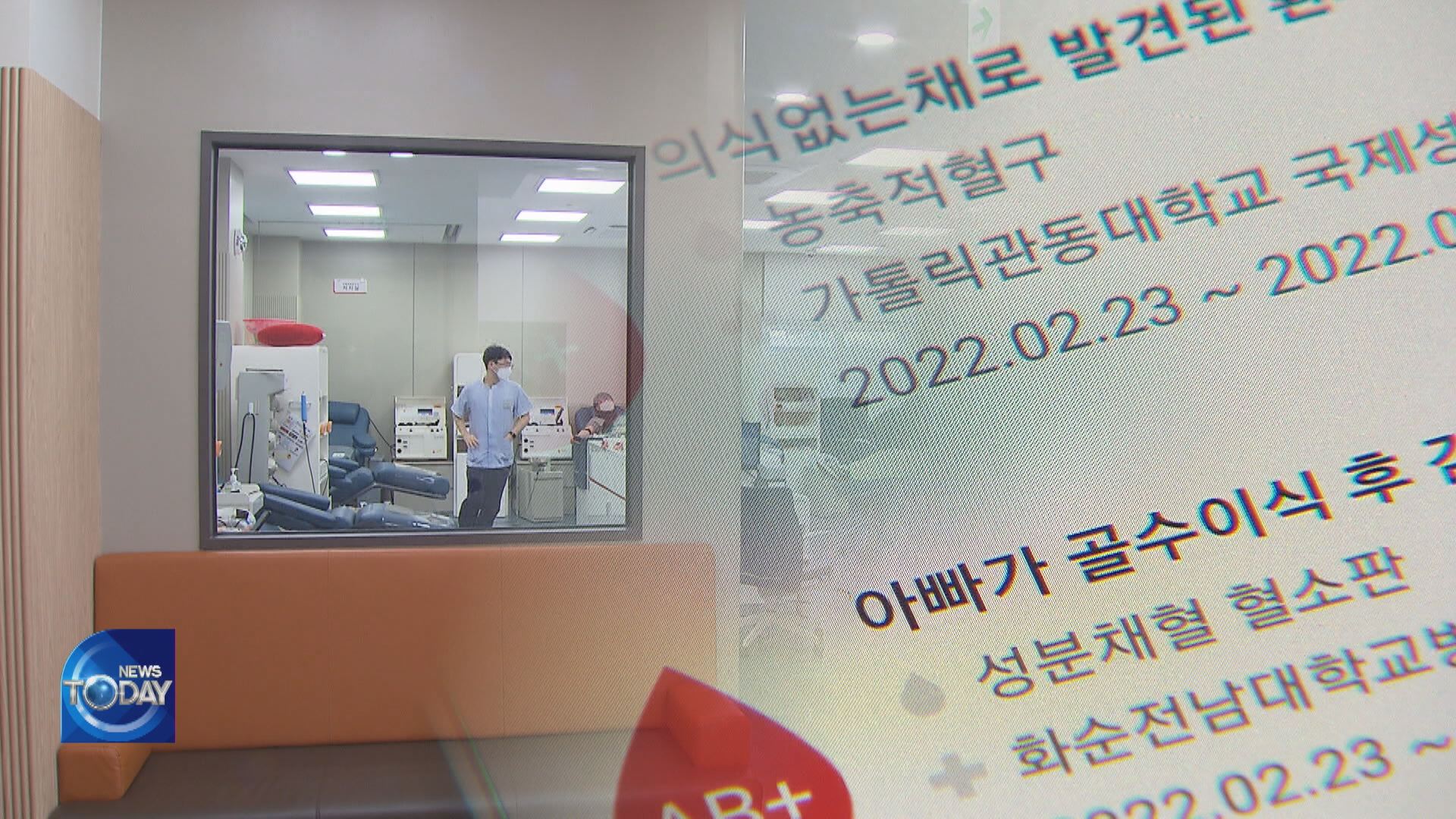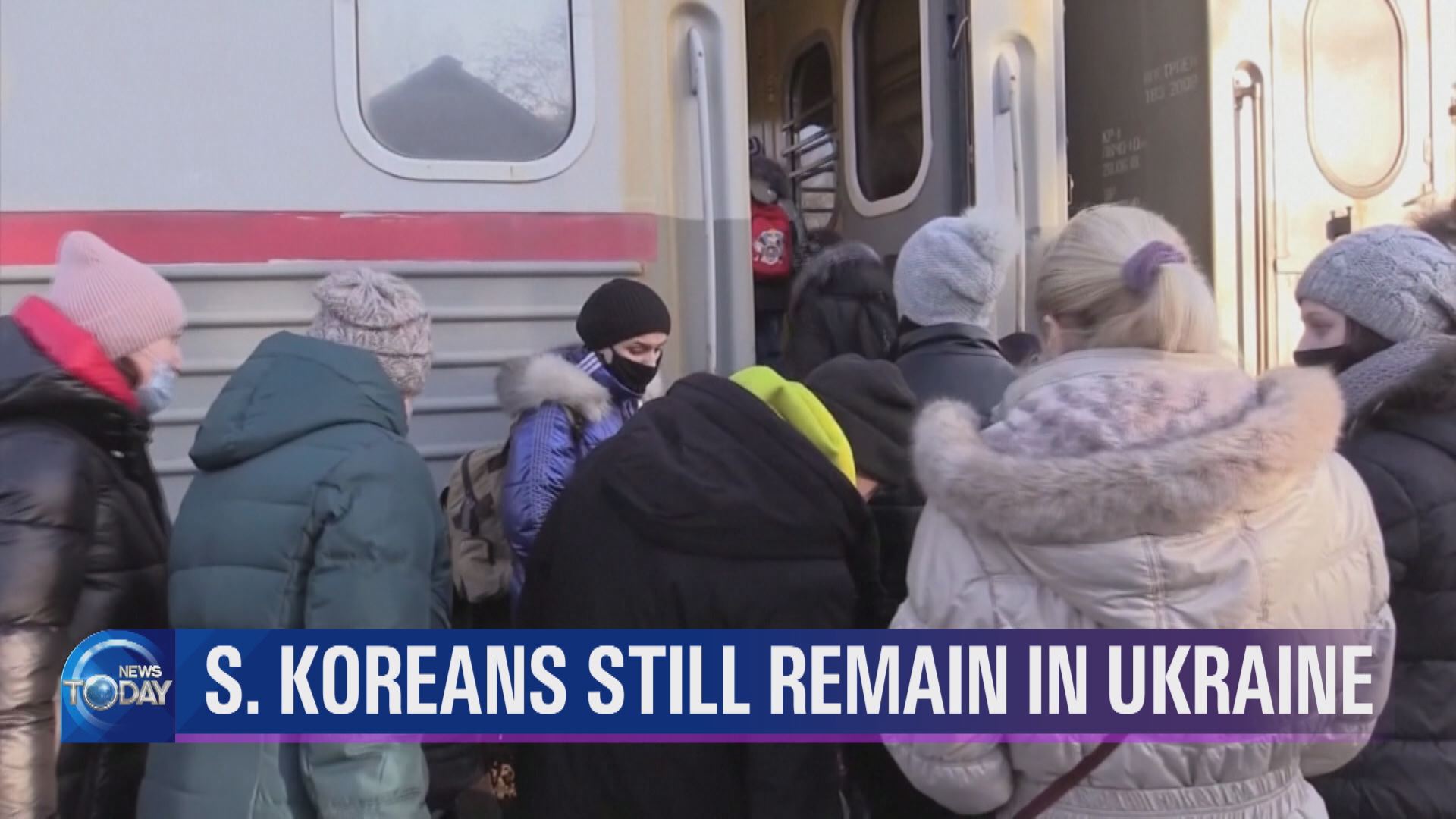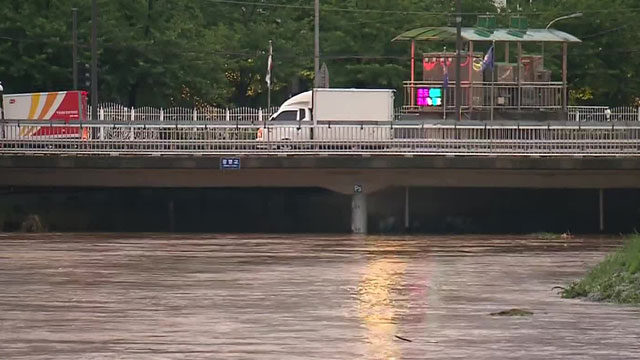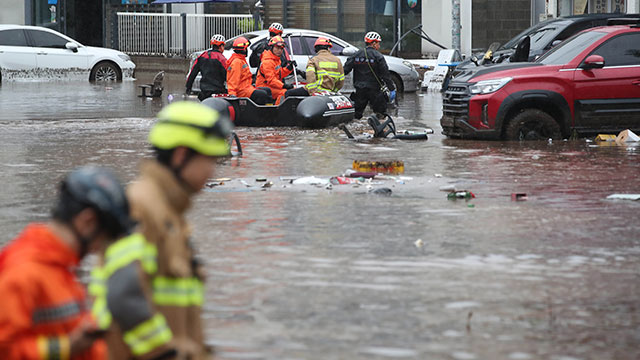BLOOD SHORTAGE AMID OMICRON SURGE
입력 2022.02.28 (15:15)
수정 2022.02.28 (16:47)
읽어주기 기능은 크롬기반의
브라우저에서만 사용하실 수 있습니다.
[Anchor Lead]
Blood supply is disrupted again as the omicron variant spreads like wildfire in Korea. The Korean Red Cross warns that a blood shortage the scope of a social disaster may come.
[Pkg]
A blood donation center located in the middle of the city. No donors are found, not in the blood collection room or the waiting area. Only about ten donors came in the past several hours. Prior to the pandemic, more than thirty donors would come in the morning hours alone, but nowadays the number keeps declining.
[Soundbite] Jeon Yeon-ju(Blood Donation House Nurse) : "The Omicron variant caused a spike in cases, causing people to avoid going outside."
Group blood donation is also decreasing dramatically. About 840,000 people gave blood in group donations in 2019, but the number fell below 630,000 last year. It has been a while since the blood reserve has fallen to an alarming level. There should be enough blood for more than five days to deal with emergencies, but at present there are only three days’ worth of blood nationwide. Adequate amount of blood reserve was maintained for a total of only ten days this year and not a single day this month. Last week, the reserve fell to 2.5 days, nearing an alarming level.
[Soundbite] Park Yun-su(Chungbuk Blood Center) : "A crisis the scope of a social disaster may come if the number of blood donors keeps declining due to the spread of Omicron."
There are concerns that such a blood supply shortage may become chronic.
[Soundbite] Kim Dae-seong(Korean Red Cross) : "Demand for blood has increased due to aging and a low birthrate means a decrease in the number of possible donors. This could cause a chronic blood shortage."
Some regions are already reducing the amount of blood sent to medical institutions. Patients and their families about to undergo surgeries are posting ads online to look for designated donors, but even that isn’t working out for some. The need for more interest in blood donation is becoming more apparent.
Blood supply is disrupted again as the omicron variant spreads like wildfire in Korea. The Korean Red Cross warns that a blood shortage the scope of a social disaster may come.
[Pkg]
A blood donation center located in the middle of the city. No donors are found, not in the blood collection room or the waiting area. Only about ten donors came in the past several hours. Prior to the pandemic, more than thirty donors would come in the morning hours alone, but nowadays the number keeps declining.
[Soundbite] Jeon Yeon-ju(Blood Donation House Nurse) : "The Omicron variant caused a spike in cases, causing people to avoid going outside."
Group blood donation is also decreasing dramatically. About 840,000 people gave blood in group donations in 2019, but the number fell below 630,000 last year. It has been a while since the blood reserve has fallen to an alarming level. There should be enough blood for more than five days to deal with emergencies, but at present there are only three days’ worth of blood nationwide. Adequate amount of blood reserve was maintained for a total of only ten days this year and not a single day this month. Last week, the reserve fell to 2.5 days, nearing an alarming level.
[Soundbite] Park Yun-su(Chungbuk Blood Center) : "A crisis the scope of a social disaster may come if the number of blood donors keeps declining due to the spread of Omicron."
There are concerns that such a blood supply shortage may become chronic.
[Soundbite] Kim Dae-seong(Korean Red Cross) : "Demand for blood has increased due to aging and a low birthrate means a decrease in the number of possible donors. This could cause a chronic blood shortage."
Some regions are already reducing the amount of blood sent to medical institutions. Patients and their families about to undergo surgeries are posting ads online to look for designated donors, but even that isn’t working out for some. The need for more interest in blood donation is becoming more apparent.
■ 제보하기
▷ 카카오톡 : 'KBS제보' 검색, 채널 추가
▷ 전화 : 02-781-1234, 4444
▷ 이메일 : kbs1234@kbs.co.kr
▷ 유튜브, 네이버, 카카오에서도 KBS뉴스를 구독해주세요!
- BLOOD SHORTAGE AMID OMICRON SURGE
-
- 입력 2022-02-28 15:15:25
- 수정2022-02-28 16:47:06

[Anchor Lead]
Blood supply is disrupted again as the omicron variant spreads like wildfire in Korea. The Korean Red Cross warns that a blood shortage the scope of a social disaster may come.
[Pkg]
A blood donation center located in the middle of the city. No donors are found, not in the blood collection room or the waiting area. Only about ten donors came in the past several hours. Prior to the pandemic, more than thirty donors would come in the morning hours alone, but nowadays the number keeps declining.
[Soundbite] Jeon Yeon-ju(Blood Donation House Nurse) : "The Omicron variant caused a spike in cases, causing people to avoid going outside."
Group blood donation is also decreasing dramatically. About 840,000 people gave blood in group donations in 2019, but the number fell below 630,000 last year. It has been a while since the blood reserve has fallen to an alarming level. There should be enough blood for more than five days to deal with emergencies, but at present there are only three days’ worth of blood nationwide. Adequate amount of blood reserve was maintained for a total of only ten days this year and not a single day this month. Last week, the reserve fell to 2.5 days, nearing an alarming level.
[Soundbite] Park Yun-su(Chungbuk Blood Center) : "A crisis the scope of a social disaster may come if the number of blood donors keeps declining due to the spread of Omicron."
There are concerns that such a blood supply shortage may become chronic.
[Soundbite] Kim Dae-seong(Korean Red Cross) : "Demand for blood has increased due to aging and a low birthrate means a decrease in the number of possible donors. This could cause a chronic blood shortage."
Some regions are already reducing the amount of blood sent to medical institutions. Patients and their families about to undergo surgeries are posting ads online to look for designated donors, but even that isn’t working out for some. The need for more interest in blood donation is becoming more apparent.
Blood supply is disrupted again as the omicron variant spreads like wildfire in Korea. The Korean Red Cross warns that a blood shortage the scope of a social disaster may come.
[Pkg]
A blood donation center located in the middle of the city. No donors are found, not in the blood collection room or the waiting area. Only about ten donors came in the past several hours. Prior to the pandemic, more than thirty donors would come in the morning hours alone, but nowadays the number keeps declining.
[Soundbite] Jeon Yeon-ju(Blood Donation House Nurse) : "The Omicron variant caused a spike in cases, causing people to avoid going outside."
Group blood donation is also decreasing dramatically. About 840,000 people gave blood in group donations in 2019, but the number fell below 630,000 last year. It has been a while since the blood reserve has fallen to an alarming level. There should be enough blood for more than five days to deal with emergencies, but at present there are only three days’ worth of blood nationwide. Adequate amount of blood reserve was maintained for a total of only ten days this year and not a single day this month. Last week, the reserve fell to 2.5 days, nearing an alarming level.
[Soundbite] Park Yun-su(Chungbuk Blood Center) : "A crisis the scope of a social disaster may come if the number of blood donors keeps declining due to the spread of Omicron."
There are concerns that such a blood supply shortage may become chronic.
[Soundbite] Kim Dae-seong(Korean Red Cross) : "Demand for blood has increased due to aging and a low birthrate means a decrease in the number of possible donors. This could cause a chronic blood shortage."
Some regions are already reducing the amount of blood sent to medical institutions. Patients and their families about to undergo surgeries are posting ads online to look for designated donors, but even that isn’t working out for some. The need for more interest in blood donation is becoming more apparent.
이 기사가 좋으셨다면
-
좋아요
0
-
응원해요
0
-
후속 원해요
0

















이 기사에 대한 의견을 남겨주세요.